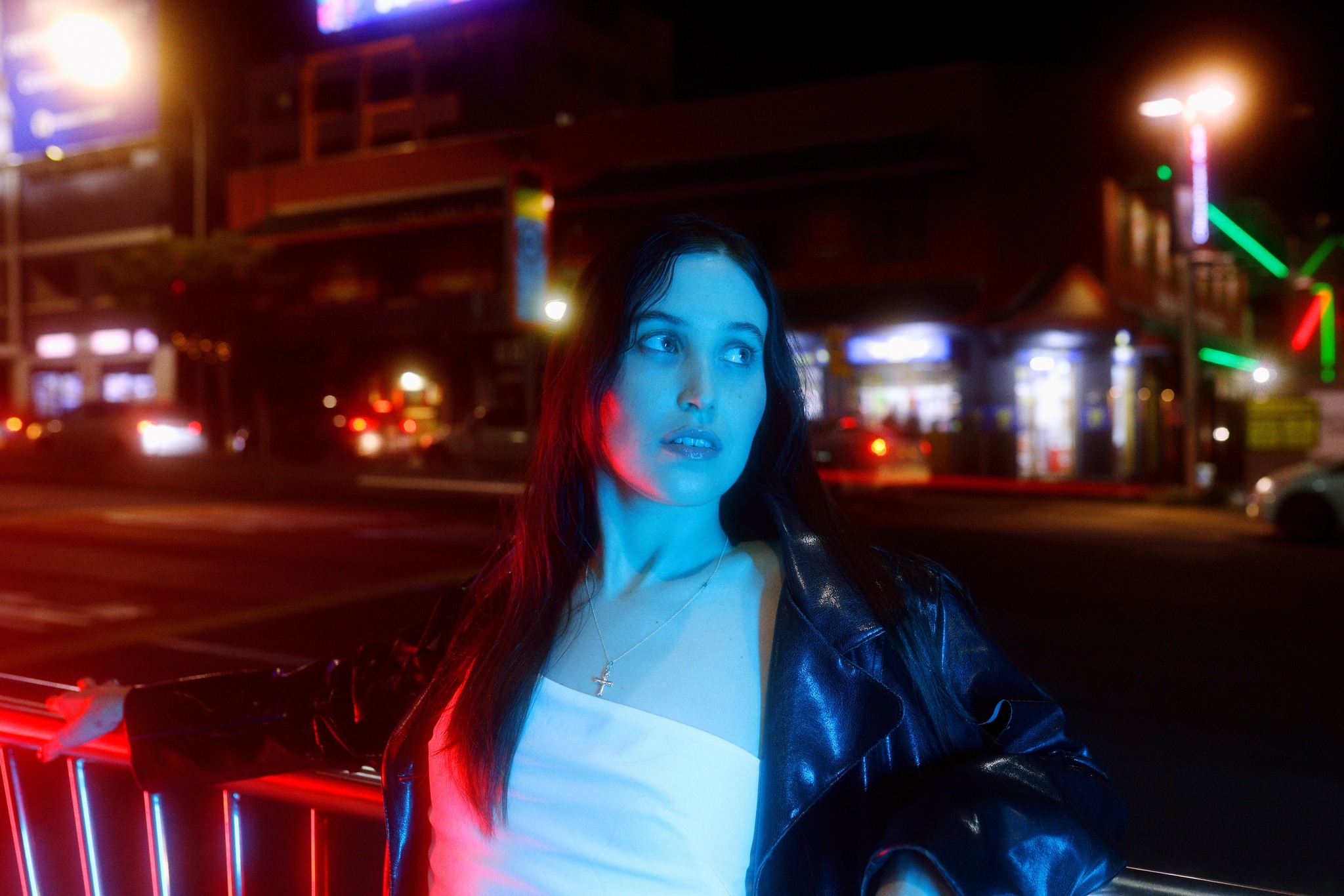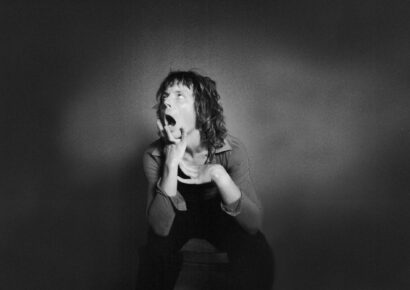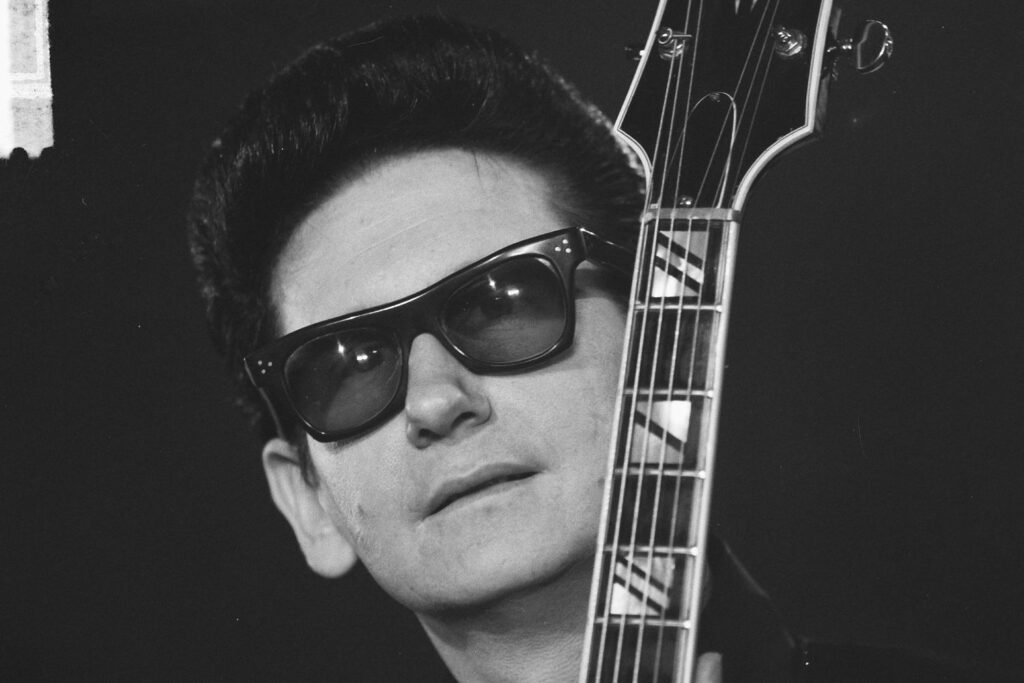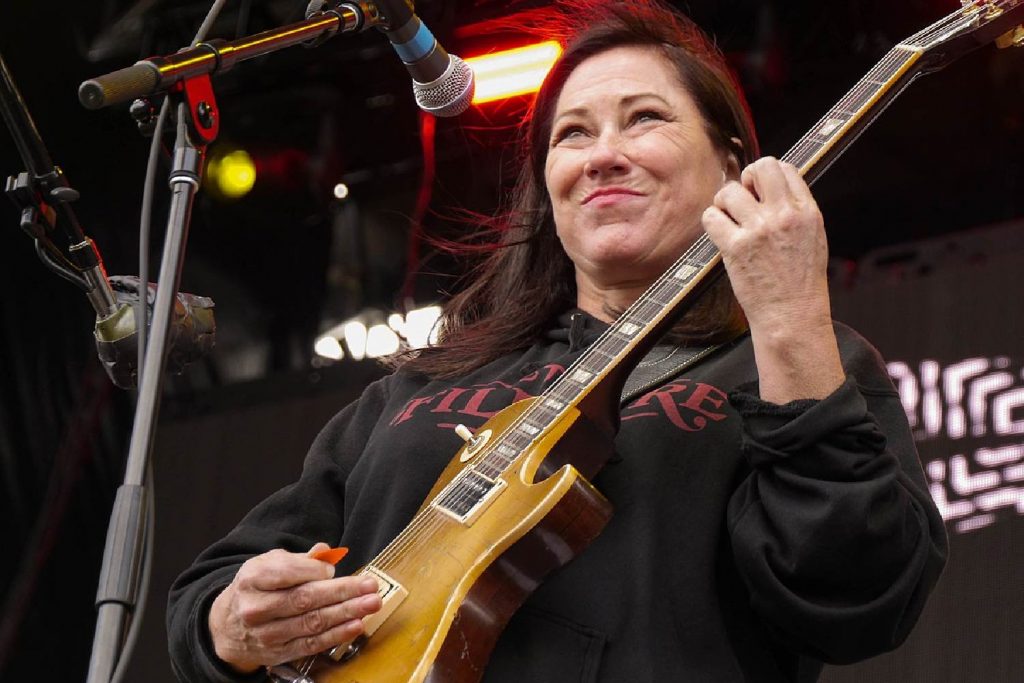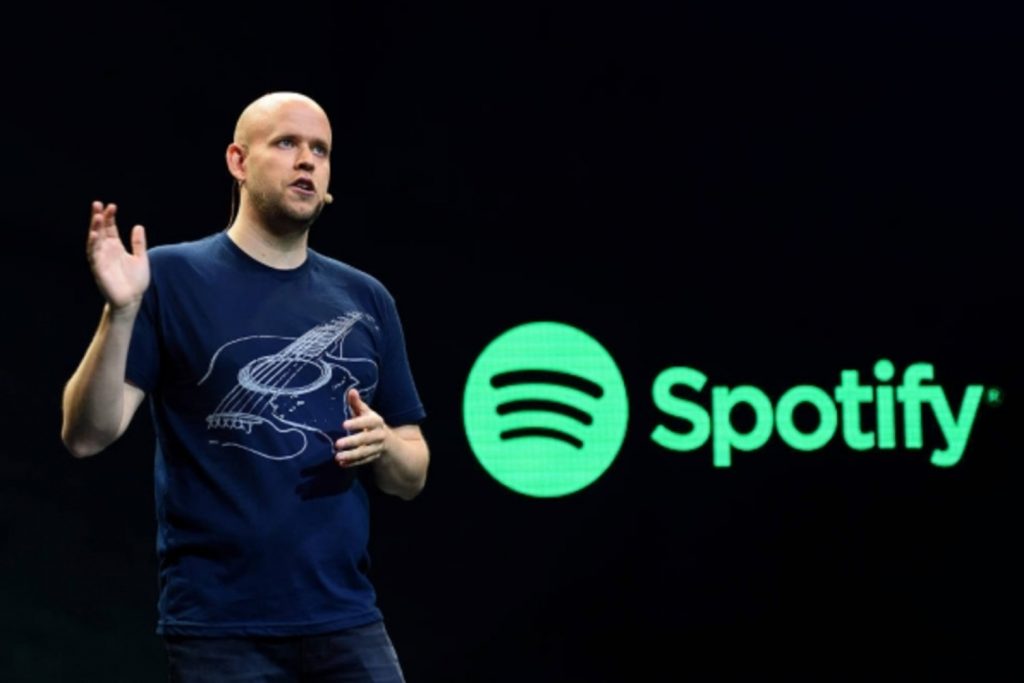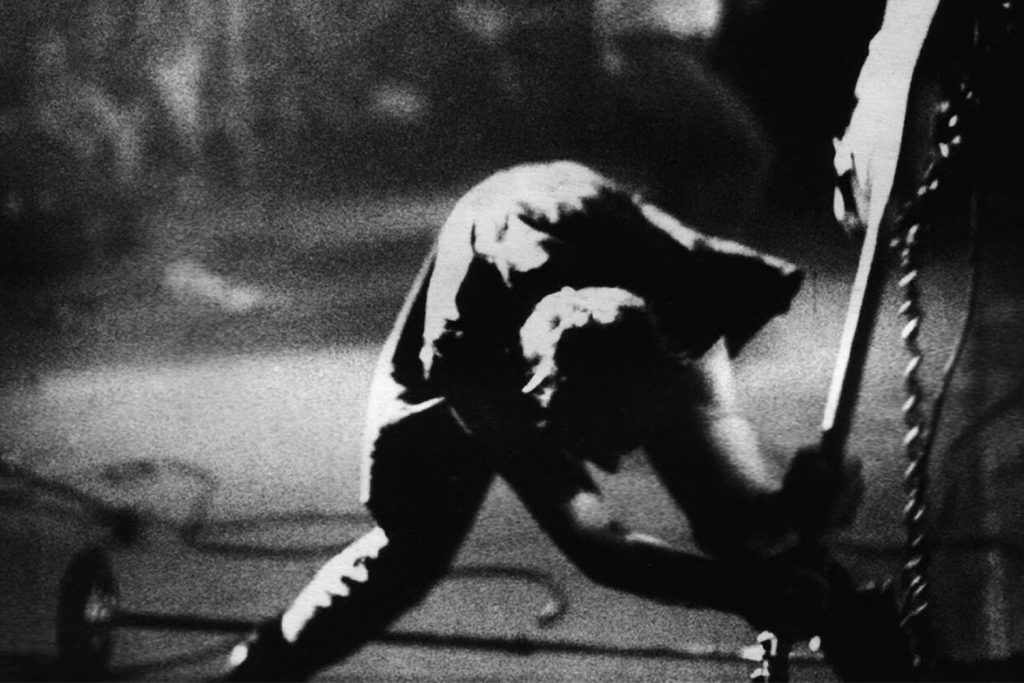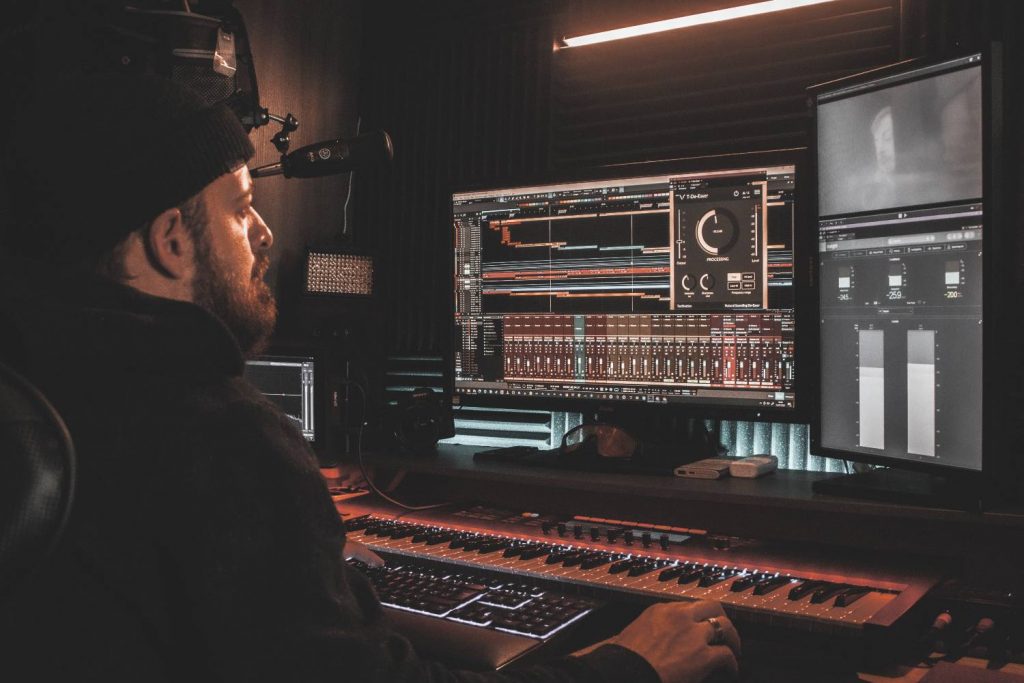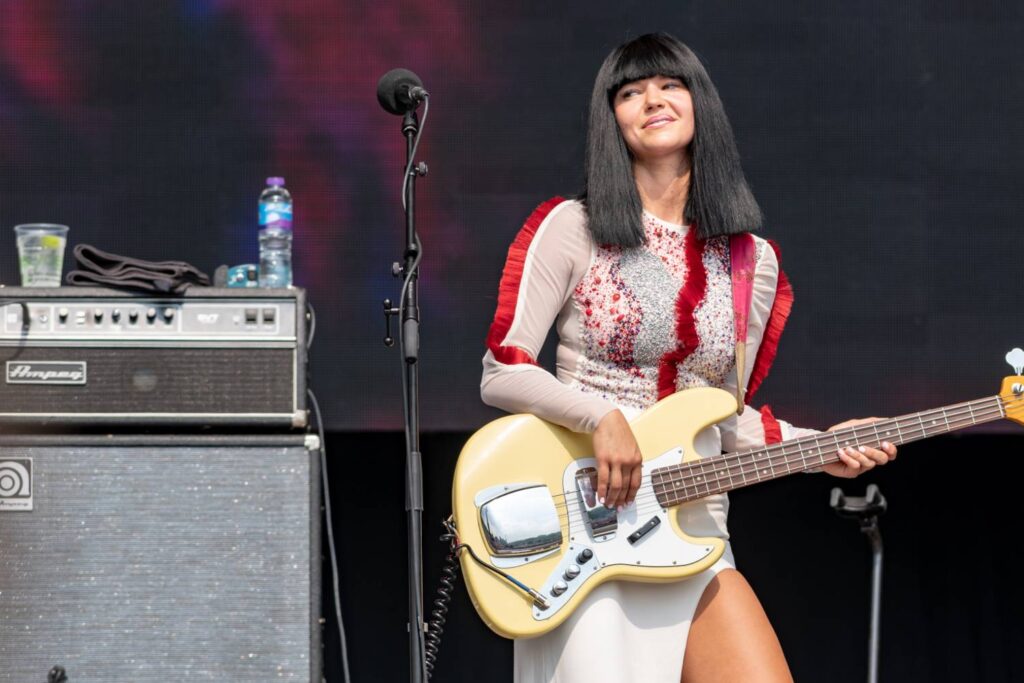Photo by Nick Maguire
Hatchie, Brisbane's beloved pop-shoegaze songstress sat down with Mixdown to chat about the digital deluxe version of her 2022 album 'Giving the World Away'.
Hailing from Brisbane, Hatchie, AKA Harriette Pilbeam’s music has most commonly been described as a shoegaze/pop hybrid. However, she has shown the diversity in her sound, grabbing elements from trip-hop, industrial and acid house as the project has evolved.
Hatchie is back with the digital deluxe version of her 2022 album Giving the World Away. This version comes complete with five new songs, with Jay Watson of Tame Impala, GUM and Pond playing the drums on three of the new tracks.
Read up on all the latest interviews here.
To commemorate the release, Mixdown spoke to Hatchie and long-time collaborator Joe Agius about their essential gear, the trials and tribulations of lockdown recording and the making of the new tracks that feature on the extended LP, which is set for release on April 7.
Congrats on the release of the digital deluxe version of Giving the World Away! How does this edition differ from the original release?
Harriette: Thank you! It has got a few extra tracks that Joe and I wrote. We worked together on the album in Brisbane and our producer Jorge [Elbrecht] was living in Denver at the time. This was in 2020, so we couldn’t be together in person. Then in the period of 2021 when we were waiting for the album to come out, we finally were able to go over to Denver and we wrote a bunch more songs that we felt deserved to be on the album and fit into the same world as the album. We thought it would be a bit of a waste to not use them because we have no idea what the next album is going to sound like yet. We wanted to put them together in a neat little package. There is also a remix from our friend George Clanton that we figured would fit in too.
What was it like working in Brisbane but having Jorge being in Denver?
Joe: It was easier than expected because Jorge is up at all hours of the day, so it felt like we were on the same time zone, even though we definitely weren’t.
Harriette: He would stay up until like 4 or 5 am some nights doing mixes.
Joe: Yeah, it worked out. I think it gave us a real purpose during lockdown, it felt like a job we were clocking into every day. It gave us something to do for sure.
Harriette: It definitely took longer in some ways because we were doing it all over email, we would have to wait to have someone listen to your mixes and write their notes and you’d be asleep and read them 8 hours later. So, it stretched out the process in those ways, but it was good in that it meant we could fine-tune everything because we weren’t rushing because we weren’t paying for expensive studio time or something.
Do you guys have a studio at your place?
Harriette: No, just a home set up, we have a lot of gear and a spare room we were doing it in at that point but nothing fancy.
Did you immediately know once you recorded the new songs that they had to be on Giving the World Away?
Joe: We both felt like that it isn’t where we thought the next album would go and because the record wasn’t out, we were still writing toward that sort of theme and that world. We hadn’t moved on yet.
Harriette: Yeah, I felt like it was pretty instant. In the moment I was like ‘I wish I put this song on instead of this other song’. For some of them, it was instant but there were also 5 other songs we wrote in that week that didn’t end up going on the album, so there was a lot of back and forth deciding which ones made the most sense.
Are you going to put those 5 songs toward the next album?
Harriette: Some of them are really different, some of them are a lot more dancey. I felt like 4 tracks was enough for the deluxe. I don’t know if some of them are too far in a different direction or if I even want to go in that direction for the next album or not.
You worked with so many amazing people recording the album and the digital deluxe version what was it like working with people like James Barone (Beach House) and Jay Watson, on your own music?
Harriette: It was cool. It was so cool with James, we played a few shows with Beach House years ago but I don’t think we ever met. That was a connection through Jorge our producer because they were both stuck in Denver over the lockdown. Then with Jay, we are friends with him, and we initially asked him to do a vocal and then Jorge was like do you want to get Jay to do drums as well because he’s a great drummer and we all love his drumming, so it made sense. It was sick, we love both of their music already, so it was a really great pairing.
Joe: What we got back straight away was perfect, it wasn’t difficult. Sometimes with drummers it’s difficult to figure out what the best match is.
Is it hard not having a set band?
Harriette: Yeah, it can be but it can also be really good at times, because it means we can change line-ups. We were spending a lot of time in America last year so we were like if we want to play shows we just need to find a drummer here instead of flying our Australian drummer over. It does sometimes work in our favour, because we can slot people in and out, it is hard at times when it is just the two of us trying to figure it out.
Joe: We are looking for a more permanent group of people for the future.
Harriette: Joe has to teach everyone all the parts every time and I think he’s a bit over it (laughs). We counted the other day and we’ve had 6 guitarists, but we are still friends with all of them. Everyone is just never free at the same time.
Joe: I hope it doesn’t look bad from a fan perspective, that we are just burning through all these people because we are awful people or something like that.
Cocteau Twins have been an influence on you and your music what was it like working with Robin Guthrie on the Sure remix?
Harriette: It was sick, it was really early on for this project, so I was a lot less confident than I am now and had no idea what I wanted. So, it was scary talking on the phone with him, but he was lovely and really open. That mix was a test to see if we were going to work together on an EP or an album after that, and we didn’t end up doing that. Funnily enough the reason we didn’t end up doing it is because he lives in France, and we didn’t want to do it over the internet. It’s funny because that’s what we did for this album, we did it over the internet, but back then that didn’t seem possible. We were just like if we can’t get there in person there’s no point. Now we are so used to working over the internet like we hardly ever work with people in person. It’s interesting how different that could’ve worked out. It was great and it is still crazy to me that it happened so early on.
It was only in 2018 that you were working in a café in Queensland, then fast forward to now you’ve collaborated with some of your biggest inspirations and travelled to world. How has it felt having all this happen so quickly?
Joe: She’s still working in a café (laughs)
Harriette: I am back in a café (laughs). What you said is true, but since covid I had to go back to work. At the end of 2020 I went back to retail, and I did a year in retail. Then we spent a year touring, so I quit again and now I’m back in a café. It’s been really cool, it is still really surreal, we are very lucky and hopefully I get to quit again soon. At that point it was really overwhelming and a lot to digest and adjust to, thinking about all the things that could happen and them happening really quickly. I learnt a lot quickly. I am lucky I had Joe doing the whole thing with me.
Joe: It felt like a big moment quitting your day job to do music full-time but unfortunately it doesn’t mean much anymore.
Do you think it’s harder to make a living off music in Australia than it is if you were living in the States?
Joe: I think because you are only touring like three cities generally in Australia, but you can’t do that every week, probably only twice a year. In America we have done 35 shows in 30 days and that is much more realistic money wise to make a living over there which is why we visit so much.
Harriette: It’s hard because there are more touring opportunities everywhere else, but I think you get better royalty payment here and there’s like grants and other things. There are pros and cons to both, but I think what Joe said is the main thing that messes it up here.
Basically, all the reviews of your music say something along the lines of ‘shoegaze gone pop’. I know that you’re a fan of a lot of 90s shoegaze bands including My Bloody Valentine as well as contemporary pop musicians like Carly Rae Jepsen. Do you feel like today as so much music has been made it would be a missed opportunity if you didn’t embrace what you enjoy of different genres and eras to create something unique and new sounding?
Harriette: Yeah, that was definitely the point when we started recording for this project was to really blend multiple genres because it felt pointless to just recreate one sound, like just do shoegaze or just do pop. There are a million people doing that but at that time there weren’t many people around here blending the two. I felt like we saw an opportunity and we took it. I am really glad that a lot of people pick up on that because that was our goal.
Joe: Yeah, I think the funnest thing with this project was really just trying to find an interesting balance of pop and sonics that come from a shoegaze, dreampop background. Sometimes it leans in a more pop way sometimes it leans in a more shoegaze way. Finding that balance is the most interesting thing to us right now.
Is the shoegaze/pop hybrid title how you would personally describe your music?
Harriette: I think that’s the easiest way to describe it or dreampop.
Joe: It’s becoming less and less guitary, so I’m not sure.
Harriette: I think some shoegaze aficionados might get annoyed with us calling it shoegaze, so I always add the pop afterward (laughs).
Are there any other genres that you have pulled inspiration from? ‘Nosedive’ has a synthpop feel and you cited the 90s indie-dance band, Saint Etienne as an inspiration for ‘This Enchanted’.
Harriette: Yeah, definitely some dance elements, particularly with the most recent album and some industrial elements. Trip-hop was a real influence on the most recent album.
Joe: Yeah, drum-wise a lot of industrial stuff. It’s a real mix of a lot of things now. It’s hard to explain because I feel like each song has its own algorithm of genres, its all so different now. We have two and a half records out and it’s all so varied its hard to pigeonhole it these days.
What industrial stuff are you inspired by?
Harriette: Well, most of it we wrote after went to a goth club, so there was a lot of goth and industrial music playing there. We both really like Nine Inch Nails and Curve.
Joe: And Ministry and Depeche Mode.
Harriette: So pretty mainstream industrial I guess; I haven’t really gone super deep on it.

Carly Rae Jepsen records around 300 demos for every album she releases. Have you ever felt the need to take a leaf out of her book in that regard?
Harriette: God no that’s too many! Maybe if I was getting paid adequately sure.
Joe: It depends, people will name ideas and snippets a demo, but for us we would only call a demo a full song. We don’t usually finish things unless we think it’s got potential to be good enough to be on a record. For us I think we write 10 bad songs for every good song. We do write of music, but it depends on what you call a song or not.
Harriette: I’ll re-do a song like 10 or 20 times so it will end up sounding really different from the original, but I would still count that as one song demo. Whereas I think a lot of pros would count that as 50 different songs. So surely that’s what the case is with her because that is crazy.
A lot of songwriters get inspiration for lyrics from different places, for example Sonic Youth’s Kim Gordon is known for using lines from books in her lyrics. Do you ever get inspiration for your lyrics in seemingly unorthodox ways?
Harriette: I definitely get a lot of inspiration from movies and books but a lot of it comes from just real life or a narrative we come up with together when we are writing a song. I often will write a line or an idea when I get inspiration for something, but I don’t write down what that inspiration is from, so when I am looking at the note like 6 months later, I am like ‘I have no idea where this idea came from but I’m going to keep it’. So, I don’t keep track of what my inspirations are, so it is hard to say.
Joe: We both write lyrics very differently. What I like about Harriette’s lyrics they usually mean something which is why they resonate so well with people. I more like just coming up with rhymes, usually I just have one line everything is based around. Sometimes the story or the meaning reveals itself to you later.
Harriette: I think the weirdest place that I have got inspiration from is from something my grandma said and she has really bad dementia, so she says a lot of non-sensical phrases, and I have written a few of them down because they sound a lot more meaningful than they actually are. It is quite poetic without her actually realising that.
Which pieces of equipment are integral to the band when it comes to translating Hatchie’s essence from a recorded to a live context? Are you trying to replicate your studio sound when you perform, or do you prefer to let the songs breathe and find their own live groove?
Harriette: In some ways we used try to recreate them as closely as possible, so we got a lot of tracks, we had backing vocal tracks and instrumental tracks, but they sounded more live because of the drums being acoustic sounding. These days we travel as a three piece, and we don’t have a live drummer, so we have a drum track as well, so it has been interesting figuring out how to make that sound impressive enough without a real drummer, so we have had to make some changes.
Joe: The drum machine has changed the vibe of a lot of songs, I think in a cool way. We could’ve just put the drum tracks on the record as the backing tracks, but we thought we’d create its own unique version for a live show.
Harriette: So it sounds a lot less like karaoke.
Joe: I am pretty hard on trying to replicate things live. A lot of the sounds on the record that I am playing, I sample on my keyboard, because a lot of the synth sounds are from 5 to 10 different plug-ins, keyboards or synths and I can’t bring them all on the road. So, I have one sample synthesiser that I basically record all the sounds into, and I can just switch between everything on the record. But it is hard because a lot of the songs have 4 or 5 guitars on them. That is the hardest part.
Harriette: I always have chorus on my bass, chorus on my vocals, chorus is a big one for us. Joe brings a cowbell in Giving the World Away, as there is a cowbell in that song. Then when we were playing Take My Hand that song had triangle in it, so Joe was playing triangle on stage. Our drummer used to have windchimes to make everything sound more fresh and live. There are always little sprinkles of things. Joe also has an SP-404 that triggers a lot of the sample sounds.
Joe: Yeah, I have a SP-404 that has lots of one-shot noise hits, like sirens and bells. We use that when we are performing live, it’s again just so I don’t bring a million different things on tour, it’s all just within my Nordwave and SP-404, I can basically switch between anything in the record.
Harriette: The SP-404 makes the live show more live, instead of putting the siren in the backing track with Joe just triggering it, there is a lot more energy to it.
Have you ever had 5 guitars on stage?
Harriette: No, I think the most we’ve had is three we had 2 electrics and one acoustic. I don’t know if we will ever get there, it has to be a pretty special show.
Joe: We’ve taken the acoustics out of the band now, even though a lot of the songs have acoustics. We are keen to make a more electric sounding vibe live.
Harriette: Yeah, we are more of a shoegaze sound live. It is hard when you’re playing tiny venues with sound people you don’t get much time with to perfect that acoustic sound right.
Are there any pieces of gear you’ve acquired, be it something cheap that punches massively above its weight, or a less-wallet friendly splurge, that have tangibly influenced the way you write and record music to this day?
Joe: Well, ‘Try’ the first song we ever did was done using an old Yamaha PSR keyboard which is almost a kids keyboard, it just kind of has cool sounds on it, it’s a bit Beach House-y I guess. We used that a lot on the first single and songs after that. Harriette has been using that to write recently. I also constantly buy and sell gear, so I never have the same things in my room.
Harriette: No piece of gear is safe here (laughs).
Joe: I use a lot of Roland synths, a Roland Jupiter 50 there are pad synths on there that are basically on every single song that we’ve done, it is kind of the glue for this music, if it feels a bit empty, I just put that in there and a Roland System 8 as well that we used quite a bit on the last record. It is just a lot of guitar pedals, a lot of synths, it’s kind of mixing things up in different ways every time.
Harriette: I think that original keyboard is the perfect example of a cheap thing that ended up being really good. That was just a friend’s cheap keyboard that we borrowed.
Joe: I feel like you really liked the Line 6 M5 multi effects pedal. You always used that.
Harriette: Yeah!
Joe: It has weird pattern tremblers and the particle verb on that is actually a huge part of Hatchie’s music. It’s almost like a Slowdive kind of sound that’s just like a particle verb that we put in the background of everything and builds choruses up and adds a lot of dynamics to everything.
What’s next for Hatchie?
Harriette: We’ve both been working on a lot of music at the moment. But, in terms of releases for Hatchie after the deluxe edition, I’m definitely taking it slow I don’t want to rush into the next era. Joe’s got his own music that he is working on that would be nice to give that more time as well, because we’ve been busy with Hatchie for the last 5 years. He makes music under the name RINSE and yeah, a few more shows around Australia, we don’t have anything booked or planned post-august, so we’ll see.
Joe: Yeah, some breathing room this year and kind of both focusing on getting back to writing and falling back in love with that side of things because it is really easy to get burnt out when you’re going toward a record. It was a lot of pressure last year, so, I think just chilling out a bit.
Harriette: We both have other facets of music we want to focus on as well. Joe is getting into production and co-writing with other people, and I had a meeting today recording vocals for something completely unrelated. Top lining and jingles are a world that we’re keen to explore. Trying new things.
Keep up to date with Hatchie here.
